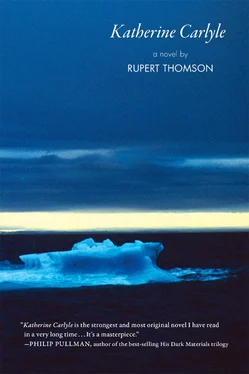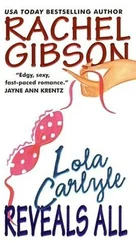I turn back, moving past the hotel. The settlement occupies a narrow shelf of land between the fjord and a steep craggy ridge. Though the buildings mostly face the water, they seem randomly arranged, as if they were dropped from a great height and then allowed to remain where they landed. Some look traditional, with intricate white fretwork around the doors and windows, their clapboard exteriors painted in yellows, blues, and greens that have been bleached and ravaged by the weather, but there are also larger, more utilitarian blocks made of bleak gray-brown brick. Municipal buildings like the school, the canteen, and the museum are to be found on or around the square. The naive, almost visionary murals on many of the facades — explorers, castles, whales, longships, domes — stand out against the landscape, like wishful thinking or white lies. There are very few people about — just, sometimes, a woman hurrying along with a plastic bag or a man wearing an orange helmet with a light on the front.
I walk down a path and across a football pitch, the goalposts rusting, netless, then I climb a slope to a road that is flanked by long low warehouses, many of them open-ended. One contains an enormous eerie heap of sawdust. Another is piled high with bags of cement. A third warehouse is filled with small green tiles, some of which have spilled onto the ground outside. There’s a faded red building with a row of cages attached to the exterior wall and a sign that says PIG HOUSE in English, and when I stop and listen I can hear the animals inside, snuffling and squealing. I’m about to knock on the door when a man appears, cradling a piglet in his arms. With his blue-gray complexion and his sunken cheeks he looks like an undertaker, or one of the undead, but I sense a gentleness in him.
“Angliyski,” I say, pointing at myself.
He points at the piglet. “Russki.”
When I ask whether I can see the pig house he seems to caution me — I think he’s telling me the smell is bad, and that it will stick to my clothes — but then he shrugs and unlocks the door. Once inside, he leads me from pen to pen, introducing each of the pigs by name. Using a combination of words and sign language I ask if he slaughters them as well. Of course, he replies. That’s his job. Heated by banks of ancient radiators and lit by large dim bulbs, the atmosphere in the building is soupy, sickeningly sweet, and it’s a relief to step outside again. He makes a joke about how we both smell bad now, then he invites me into his house, where his wife offers me a glass of juice and some hard biscuits that taste like dust. My hunger is such that I’m thankful for anything.
By the time I leave their house it is two in the afternoon, and the light has altered dramatically. Though the sun itself isn’t visible, it has risen high enough to illuminate the rugged land on the far side of the fjord. The top half of the mountains is a rich orange, the color of marmalade, and the lower slopes, which remain in shadow, are a muted, atmospheric mauve.
“Amazing,” I say out loud, even though I’m quite alone.
At the far end of town I come across a building with the words GREEN HOUSE on the side. The door has been left ajar. I look both ways, then step inside and find myself beneath a huge slanting roof of glass panes, many of them broken or missing altogether. The round columns that support the roof have been painted silver white, with horizontal flecks and streaks of black. This nostalgia for birches, which I first noticed in the mural, seems especially poignant in this town, not just because of its extreme isolation, but because it’s a place that has no trees at all. The greenhouse looks to have been abandoned for some time, the raised area where vegetables once grew now covered with spongy moss and rust-colored grass on which a ragged dummy sprawls, half scarecrow, half voodoo doll, its blank stuffed bag of a face topped with a trilby. Sitting on a chair I sketch the interior — the trailing, desiccated plants, the pipes tangling on the far wall, the fall of gray light through the smashed glass panes. I draw until my feet go numb. When I leave the building, the sun has withdrawn from the mountains, and the air is so cold that it seems to creak and snap like an old man cracking his knuckles. I hurry back to my hotel room where I run a bath. The water that gushes from the tap is brown and slightly sticky. I lie there for half an hour, my body only hinted at.
That evening I appear in the bar on the stroke of seven. The dark-haired woman remains expressionless, her face Kabuki-like, though I sense an air of grim satisfaction, as if she thinks she might have taught me a lesson. I don’t see her as vindictive or malicious, only impatient with those who fail to abide by what is, for her, completely normal practice. She might also resent foreigners, since we have enough money to come and go as we please.
I eat dinner in silence, as before. It’s so quiet that I can hear the blood circling round my body — or perhaps it’s the fizzle of the lights behind their plastic panels. Afterwards I make a cup of instant coffee and go up to my room, where I watch a Russian film in which men gallop about on horses shooting each other.
/
At breakfast on my third morning a man of about thirty-five is sitting at a table just inside the door, bent over a bowl of dry cereal that looks like puffed wheat. The moment I sit down he looks across at me and asks me, in English, where I’m from. I’m Misty, I tell him. From England. His name is Anatoly, he says, and he comes from Moscow. He works as a doctor in the hospital, which is the red-and-white building opposite the hotel. His contract terminates at the end of the month. When I remark on his meager breakfast, he tells me his stomach troubles him. The pain keeps him awake at night. I ask if he’s on medication. He indicates the mug next to his bowl. Tea, he says. His eyes are red-rimmed and haunted, like a figure in a painting by Munch, and his posture is stooped, his shoulder blades poking through a thin striped sweater.
As I eat, he tells me that the town’s drinking water is taken from what he calls “the lake.” Many local people have problems with their stomachs. Also with their teeth and bones. He recommends that I buy water, and points at the bottle on my table, imported from Germany. He will be glad to leave Ugolgrad, he says. The place isn’t good for him.
Since I never expected to meet anyone who could speak English I view Anatoly’s presence as a stroke of luck, a kind of blessing, and I have so many questions suddenly that I can hardly choose between them. The other places I have visited only engaged my interest obliquely, but it’s important I learn everything I can about Ugolgrad, since I am already thinking of it as home. I start by asking about the miners. Most come from Ukraine, Anatoly tells me. They earn six thousand rubles a month — which is more than he earns, he adds ruefully. They eat in the canteen, using a card issued by the mining company. They buy groceries there too. No money ever changes hands. When I probe him about safety in the mine, he tells me there are many accidents. The ground is — and he holds one hand above the other, then moves them both backwards and forwards.
“Unstable?” I say.
“Yes. Two months ago, death. Four months ago, death.”
He spoons more cereal into his mouth. The individual pieces are so light that the simple act of lifting them through the air dislodges some of them, and they spill onto the floor. It doesn’t seem to occur to him to pick them up.
I ask if he could show me round the hospital.
He nods. “Tomorrow.”
Checking his watch, he rises to his feet. His faded jeans look too big for him, and there are gold buckles on his shiny black loafers. When I wish him a good day he gives me a fatalistic look.
Читать дальше












